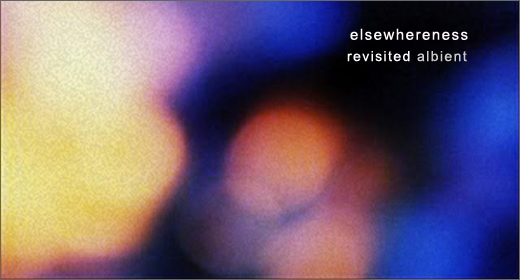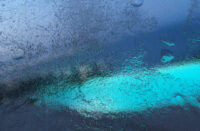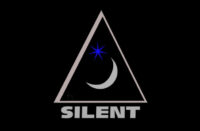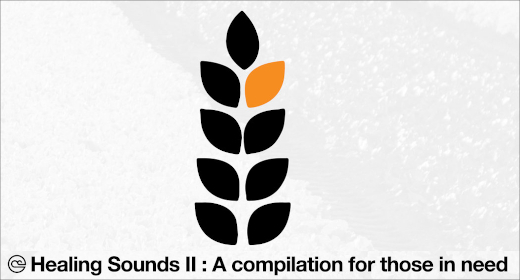Elsewhereness revisited is an occasional feature documenting the drift at the margins: ambient gasbagging and blurb blah, ’tube-d, ’cloud-ed, ‘n’ ’camp-ed up, complete with companion mix, Elsewhereness revisited #13.
Since inception last year Indianapolis’s Past Inside the Present has rolled out a compelling catalog of OSTs to elsewhereness. First an homage to minimalist symphonists under the banner Orchestral Tape Studies, in which orchestral loop fragments are layered with field recordings and faint drone billows for meditative exploration of liminality and tonality. ‘Healing sound propagandist’ zakè (扎克) is behind it, with companion, Orchestral Tape Studies [Tyresta Reworks], a reimagining by Chicago-based Nick Turner aka Tyresta that preserves the original’s contemplative nature while adding new dimensions of depth and opacity. Tyresta also, incidentally, put out Fallen Moon, four ethereal pieces of modular synth, tape manipulation and FX. Then Wind Colors, six pieces saturated with environmental ambience from Gallery Six aka Hidekazu Imashige, whose initial vexation at excess wind noise in the resulting field recordings, captured as they were in a windswept winter, turned to acceptance as foundation and overall title. And Liminal, a pair of long form post-Kosmische Nu-Age ambient drifters recorded live by Jordan Christoff with no computers or presets touched in their creation, feeling like floating up in the clouds. Don’t miss zakè (扎克) with To Those Who Dwelt in a Land of Deep Darkness, a sublimated ‘scape plus Wayne Robert Thomas rework. And May / Atra vinylizes Benoît Pioulard’s May—originally digital and ltd ed. tape—adding Atra (‘black,’ Latin), four newies billed as ‘a blustery penumbra against the verdancy of the May EP.’
Great axescapeist, Hakobune, transcends ambient drone tropes in two longform tracts of harmonic layers using subtractive (and additive) methodologies to bring out undercurrents in variations on a theme never strayed far from in The Last of Our Time Together. Ludvig Cimbrelius (aka Purl, Eternell, Illuvia) purveys lush guitar swells and blissy atmo on Intimacy—all a bit rich for the blood, larded with cloying vox and blah about transcendence. PITP’s Director of Artist Relations Isaac Helsen does it better with his Remnants Vol. IV and Vol. V documenting mental health vagaries while deconstructing album concept via a series of sounds reassembled from varying styles and stages of fragments. An 8-part project with vols in sporadic release through 2019 in line with the unpredictable nature and conceptual processes of such collections: IV: ‘Driving endlessly. Dreaming of a life that never was, in a time you never were.’ (bc) V: ‘The last heat of summer. Hyperawareness of physicality and existence, embracing presence and euphoria.’ (bc). Another reworker, ’90s ambient vet James Bernard, mines a vein first explored on Atwater (ASIP, 2019) with sounds wrung from Moog Mother 32, custom-built filters and various Eurorack modular sequencers, modules and FX; using a now honed method of small pieces from his archives (some just 20-30 secs), taken and run through various granular stretching and FFT processing modes, he creates in Fragments a themed series of ethereal, almost postclassical, vignettes. Past Inside the Present incarnate.
Still on a Pioulard tip, July’s Persona EP was supposedly set to ‘transform[ing] the pioneering composer into a poster child for the new wave of rejuvenating ambient soundscapes.’ Blimey. Poster child. Ambient soundscapes. Incongruous?—Moi? Moving swiftly on, Thomas Meluch alludes to a theme of ‘how major shifts in life can help reveal you to yourself in the way pieces of a mask crumble away with time’ in the title of this mix of ‘melancholy, hope and letting-go,’ a rich fusion of guitar, synth (and occasional voice) reflecting a developmental trajectory of thirteen years. Opener “3L” sets a tone akin, in the artist’s words, to ‘light opening up, a slow fog rolling in or a buried dream confessing itself in the moments after waking.’ Mellotron hosts.
Mssr. Pioulard is among those featured on the upcoming Fluid Audio-curated Place Language. Inspired by writer Robert Macfarlane‘s Landmarks. Its topographic glossaries, the word-hoard of depictive landscape terms from thirty different languages, dialects and sub-dialects around Britain sub-divided by terrain type, provide the focus. Twenty eight international sound artists each selected and recorded an impression of a Landmarks topogram, the sounding act adding new aspects of dimensionality, seeking to refresh interest in our environs and reinvigorate appreciation of the audible textures and patterns characterizing place, in line with the book’s mission to ‘re-wild’ our vocabulary. A truly global collaborative ethnography of place, language, and sound. For end of September release.
After something of a breakthrough in 2015, with 新しい日の誕生 Birth of a New Day (Dream Catalogue, 2015) eliciting mainstream music media comment (‘a late night cruise through the cyber-future dream highway,’ Rolling Stone), Lost Fragments sees 2814, UK-US ambient-vaporwave vehicle of t e l e p a t h テレパシー能力者 and HKE, mix new unreleased tracks with picks from comps and early tryouts from the preceding Fragmented Memories project’s Rain Temple. So what of 2814? Says HKE: ‘There is no story here, just little windows into brief moments, like watching a ship pull into the harbour under the lights of the towers as you stand on a balcony in the middle of the night, or taking the last subway home as the fluorescent lights of the carriage flicker on and off.’ Acknowledging futurism, nostalgia, and exotica elements in their work, he goes on: ‘Ultimately, it’s all about viewing this life for the surreal dreamworld that it is and finding a certain romanticism and joy within that.’ (Tiny Mix Tapes). With avowed influences from Steve Roach, Vangelis, BoC and Burial, what’s not to like?
New on Shimmering Moods: Danny Scott Lane‘s How To Empty A Cup exhibits a classically cleansed palette, homing in on a few choice melodies edited with great forbearance. Produced almost entirely in the LA rain with a few guests contributing wind and string things, infused with environmentalia—kids playing outside, a teachers strike, a bird’s nest over a street sign, crickets in the bushes by a carpark. And Darren Harper‘s Paths, a fresh collage of kaleidoscopic chimes and playful bells tumbling round each other; twinkling loop layers and delays cascade in fragile flurries, dissipating displaced by lambent chords. Thrumming bokeh brings distant peaks closer, arcing down to hushed forest floors, winds rustling leaves, somber swells prompting contemplation of its spaces.
Milan’s Matteo Uggeri has been active since the late 90s, with band Sparkle in Grey, and collabs with the likes of Maurizio Bianchi, Controlled Bleeding, Enrico Coniglio, Francesco Giannico, Giulio Aldinucci, and Maurizio Abate. Now courtesy of Infraction comes The Next Wait, which initially stemmed from when Uggeri and wife were awaiting their first born, his anxiety of the time generating a need to voice his concerns—as a father, a musician at that, contemplating a future of potentially compromised time and energy. The album took some time to make, then the ‘wait’ was over, transformed in the new life they were all now living. The later pieces, a long track sliced into three dedicated to this transition period where family tensions occur, built round a piano melody from previous collaborator, Mujika Easel, show how the concept of waiting can be differently interpreted.
One of Uggeri’s previous colluders, Francesco Giannico (see Pagetos with Luca Mauri), has a recent solo outing, Les Mondes Imaginaires, for Time Released Sound. The sounds are delicate, as if channeling an Italian country stroll, field recordings adding timbral underlay whose liveness transmits nostalgic comfort. But though substantially about place, it’s unbounded by geo-coordinates—mondes imaginaires. Down below Giannico mixes day-night, land-water, organic-electronic, sounds against the grain, sonic alchemy forming faintly uneasy pieces.
After over 60 releases of electro-acoustic endeavor, solo or in cahoots with Taylor Deupree, Fennesz and David Sylvian, Sylvain Chauveau, Robert Hampson, Kassel Jaeger and Akira Rabelais, France Jobin, David Maranha, and Janek Schaefer, inter alia, Stephan Mathieu put his muse on hold in 2017 to focus on his mastering engineering. Now Radioland, his classic of real-time processed shortwave radio signals, received, transformed and recorded 2005–2006, sees long overdue reissue on Schwebung—remastered double-CD enhanced with unpublished 50-minute capture of a 2005 live performance at Lampo, Chicago. ‘The music on Radioland has a tendency to spread through reality its invisible tentacles of sound and invade every frequency with its incredibly thick palette, turning inaudible noise into sound, into music, into white noise again.’ (Headphone Commute)
Swede Petter Friberg has had several releases as Motionfield, most ear-piquing being Luftrum (Carpe Sonum, 2015) and Optical Flow (Somnia, 2008), a remastered reissue of which was still warm as his latest, Always There (Databloem, 2019), landed. Inspired by eponymous nature, in constant motion—from summer with its Nordic light and midnight sun to Winter months of near-constant dark, awash in oceanic synths and subtle samples, points of reference range from Boardsy retro-electronic through Ultimae-style psybient to early 90’s FAX ambient.
Kranky veteran, loscil, releases a 12th LP, Equivalents, so titled after a series of early 20th c. photos by Alfred Stieglitz that abstracted clouds into miasmic, painterly canvases of smoke and shadowplay. A fitting analog for Scott Morgan’s own musical process, outfolding forms and tones into chimeras of opaque texture and negative space, Stieglitz’s notion of photos as equivalent to ‘philosophical or emotional states of mind’ could apply to these eight slivers of shivering timbres. As on “Equivalent 7,” once a dance score for Vanessa Goodman, reworked with fellow Vancouverite, Amir Abbey, aka Secret Pyramid, wherein cryptic evolutions adrift in low oxygen atmos shift from pockets of density to dissipated streaks of moonlit vapor.
Self-styled purveyors of ~Malleable Musics & Conveyance through the Pneuma~, Huerco S.’s West Mineral Ltd., hosts 11 Items, an audio remodeling of a split between Pontiac Streator and Ulla Straus following last year’s Chat. ‘Each item exists with one another but some can have a different crunch, a tender softness, a goopy [sic] inside, or even a totally different filling. An item can be receiving tragic news, or even experiencing life altering events. Something as simple as your favorite robot singing can be an item. The sense of hopefulness, friends in a cabin, or a delicate psycho.’ (bc) and ‘they craft something with classic ambient earmarks as well as off-kilter addenda—vocals clipped so as to render everyday language strikingly alien and hand drums that melt like spilled mercury with every hit—so that 11 Items sounds disquietly immersive and uneasy.’ (pitchfork review)
Perfect Aesthetics, Arthur Kovaløv’s dinky cassette label, centres round a group of likeminds spread across St. Petersburg and Moscow. After Posh Isolation and Janushoved, its signature sound is a blend of melancholy, soft lo-fi, DIY aesthetic and cold synth infusions, evincing sensibilities from gritty to mellow—ambient drift or raw synth pop. With Awe Copenhagen industrial/ambient/drone crone, Sortlegeme, explores themes of human nature and its environs through diverse artistic means. Within waves of drones uncertain melodies float, rub up against sharp noise, voices and sounds of different objects transfiguring time.
Welsh producer Leif invites peaceful reconnection with the living world, placing us amid lush sonic verdure on Loom Dream for Whities, accompanied by an interactive site where a virtual world can be navigated to learn more about the plants referenced—following as it does a loose botanical theme, with titles like yarrow, borago, myrtus, etc.. Active since the early 2000s, Leif Knowles’ style has evolved from spruce minimal house to freaky future bass music, but this is his first ambient full-length. The six tracks play out as a single suite, seamlessly joined by bird chirp, footfalls, and reverb swirls, bearing echoes of Mixmaster Morris and The Orb-filled 90s chillout rooms. Glistening synths waft and live percussion meanders through warm chordscapes, woven with field recordings and topographic ambience, as submerged rhythms bring subtle kinesis.
Anthology Resource is an ongoing compendium curated from, and for, film and TV in the library/production music tradition by sound & music supervisor, Dean Hurley, operator of David Lynch’s Asymmetrical Studio, who has worked with him extensively for the last 12 years. While Vol. I compiled original material as heard in Twin Peaks 2017 season, Anthology Resource Vol. II: Philosophy of Beyond pursues his soundscape work into more ethereal territory. Assembled from contributions to Perfect (dir. Eddie Alcazar) and pieces made in residency for Art Gallery of NSW’s Masters of Modern Sound, it weaves a sonic tapestry from comb-filtering experiments, tape loops, and sampled field excursions into unique acoustic environments. ‘Outlining a landscape beyond physical reality, it serves as a soundtrack to the mysterious and immortal voyage of the soul into depths beyond the known and back again,’ we’re told; it asks: ‘What lies beyond physical reality? Beyond intellect and the system of the five senses, what do accounts of near death experiences, alien encounters, psychedelic drugs, astral projection, even strokes, all have to do with this and why do each seem to share a core architecture of description?’ Sacred Bones curates.
Last Orders: in no particular order, and unrelated, UK sonician Halftribe aka Ryan Bisset follows Daydreams In Low Fidelity (Archives, 2017) and last year’s For The Summer, or Forever with Backwater Revisited, another set of soft-focus drones inlaid with sparse curlicues from piano or distorted keys on Moscow’s Dronarivm. ‘Melancholia laid bare, stripped back, then dissipating into thin air.’ (bc) Next, for ambient-inclined tech-fanciers, UK technaut, BNJMN, emancipates his inner ambienteer, slave to the ’floor over a string of beat-driven techno albums and 12”s the past decade, with a first ambient album, Pyrrhic (Tiercel). It articulates a blend of formative UK ambient/electronica influences mixed with ‘a detectably Berlin-style melancholy and sexy gloom.’ Then Forse Arrivi via Silentes sister label, St.An.Da., 25 mins of Fabio Orsi split in two—”Forse Arrivi Prima” and “Forse Arrivi Dopo,” telling an Orsi-shaped story—between Ambient and Berlin-style electronics: ‘a journey by train told by those waiting at the station. The wait. The amazement. The joy of meeting. Perhaps you arrive earlier… perhaps later…’ Buon viaggio!
Last orders II: Jorge Antony Stride with Sketches on Primary Colours, billed as a compilation of compositions edited or created from longer improvisations and ideas, of which it’s said ‘the basis of these songs were [sic] experimental in nature, though mainly to serve as documentation of ideas and development,’ whatever that means. Archives curator, Agustín Mena, releases a fourth album as Warmth, Wildlife, which sees collabs with Pepo Galán and Robert Farrugia, and Taylor Deupree mastering. Just in from great Dane, Rime Trails, is Vault Tracks I: Halcyon, compiling fifteen heavy-lid doleful and delightful ambient vignettes from 2017-2018. Rui P. Andrade of Portuguese duo HRNS, moonlighting solo under cover of Canadian Rifles, sneaks out Eastern Nurseries and Of Course I Still Love You / Geranium on Eastern Nurseries. Ending in vaporous dream sequences from Plains Apparition and Encrypt on Pure Life and Sangam with Entrance Way on Chile’s No Problema Tapes.














![Pole :: Tempus Remixes (Mute) — [concise]](https://igloomag.com/wp/wp-content/uploads/2025/04/pole-tempus-remixes_feat-75x75.jpg)






![Hasbeen :: Bunker Symphonies II (Clean Error) — [concise]](https://igloomag.com/wp/wp-content/uploads/2025/04/hasbeen-bunker-symphonies-ii_feat-75x75.jpg)
